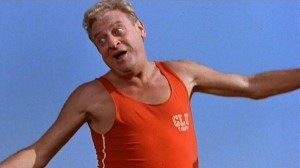Film Review: “When Comedy Went to School” Flunks Out
When Comedy Went to School, directed by Ron Frank and Mevlut Akkaya. At cinemas in Boston, West Newton, and around New England.
By Gerald Peary
Old Jew that I am, I’m putty when it comes to Borscht Belt humor. Jerry Lewis pratfalls, Danny Kaye doubletalk, Henny Youngman one-liners, Buddy Hackett blue material, all wonderful stuff! A regret of my childhood is that my family never ventured to the Catskills in their prime. Consequently, I never saw Jewish stand-up live at Grossinger’s — on all engines, among my feeding, feasting people — only the tamed-down, Americanized version on Jack Paar and Ed Sullivan and later Johnny Carson. All of that is to say that I was looking forward to When Comedy Went to School with — what else?– schoolboy excitement. Here’s a feature documentary about Jewish comedy and those halcyon Catskill days.
Oy gevalt! What a disappointment!
What a disorganized film, a seemingly random order of scenes, and tangents, relevant and irrelevant. For example: suddenly the movie is about The Old Testament, about how the name Isaac supposedly means “He shall laugh.” Another example: talk of how the Jews came to the New World. Another example: Larry King telling us how he first got laid.
A bunch of things tossed in a pot do not make a chicken soup.
This documentary had money to buy Hollywood clips from Fiddler on the Roof, Monty Python, and Mel Brooks movies. It had money to have two directors, not one, Ron Frank and Mevlut Akkaya. It had funds to pay Robert Klein to be a roving narrator, speaking into the camera like an Oscar host reading from cards, and saying slick, superficial things. But why wasn’t some major gelt spread to where it was most needed, a competent editor?
So what’s in this movie to like?
Some faded home-movie footage of Grossinger’s in, perhaps, the 1950s: people dancing, eating large, sitting unathletic by the Olympic-sized pool. And some talking-heads of octagenarian couples with the thickest Jewish accents, reminiscing about happy days in the Catskills sixty years ago.
An interview with the immortal Sid Caesar done probably three years ago, when Caesar was still in fairly good health. He’s modest, shy, likeable. (In contrast, Jerry Lewis, also interviewed, is a vain bag of wind.)
A sharp talk with Jackie Mason who, with the exception of a dreadful dye job on his thinning locks, is looking good, mumbling like he always did. He’s very funny about in-grown Semitic Catskill life: “A Gentile is someone you saw at the movies. He was six feet tall. No Jew was six feet tall.” Mason arrived there as a social director, a comedian at night, when he rejected his anointed profession: “I hated being a rabbi. I would be reading Torah, I’d look out the window, and there was a blonde!”
Am I giving away the funny lines? I am. There’s really no reason to see When Comedy Went to School beyond chats therein with Jewish comedians, and half-a-dozen one-liner jewels. Here’s another.
Rodney Dangerfield: “I was so ugly as a baby that my mother diapered my face.”
Gerald Peary is a professor at Suffolk University, Boston, curator of the Boston University Cinematheque, and the general editor of the “Conversations with Filmmakers” series from the University Press of Mississippi. A critic for the late Boston Phoenix, he is the author of 9 books on cinema, writer-director of the documentary For the Love of Movies: the Story of American Film Criticism, and a featured actor in the 2013 independent narrative Computer Chess.

